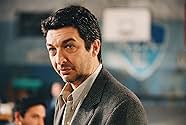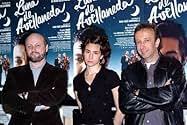Luna de Avellaneda
- 2004
- 2h 23min
NOTE IMDb
7,2/10
5,9 k
MA NOTE
Ajouter une intrigue dans votre langueThe story of a social and sports club in a Buenos Aires neighborhood and of those who try to save it from being closed.The story of a social and sports club in a Buenos Aires neighborhood and of those who try to save it from being closed.The story of a social and sports club in a Buenos Aires neighborhood and of those who try to save it from being closed.
- Réalisation
- Scénario
- Casting principal
- Récompenses
- 9 victoires et 18 nominations au total
Francisco F. de Rosa
- Darío
- (as Francisco Fernández De Rosa)
Nico Conde
- Background
- (as Nicolàs Conde)
Avis à la une
A superb movie, the best Argentine movie I've seen. The entire plot (the attempt to keep the neighbourhood social club going) is an allegory for Argentine recent history, and each character represents a strand in that, eg the old Don, the Spanish immigrant who came to Argentina so full of hope - like many - but whose time has passed. Despite the light relief and clever humour it's ultimately a tragic tale, as any good tango. I'm not sure how well it would play outside the country ie if it would resonate with people who didn't understand the allegory, but for anyone with an interest in Argentina it's a definite don't miss.
Luna de Avellaneda is a 70 years old club, in the good ol' days it had more than 8.000 members. There they teach ballet, you can play basketball, you can chat with your friends... In short: it's your family out of your family. Now, times have changed, things are getting hard and people don't have much money. The club has nowadays less than 300 members, and has lots of debts. They're going' to have to sell the facilities, they say they're gonna build a casino, they say there will be a job for everybody, they say prosperity will be back in town... they say...
This is such of a metaphor of the whole Argentinian situation. He uses this club to represent the reality of a country that's been hurt very deeply, surrounded by looters and sick of promises. A country which uses the sense of humor and the sarcasm as a medicine.
Two hours of rage, love after love, and tons of hope... (we really need that) *My rate: 8/10
This is such of a metaphor of the whole Argentinian situation. He uses this club to represent the reality of a country that's been hurt very deeply, surrounded by looters and sick of promises. A country which uses the sense of humor and the sarcasm as a medicine.
Two hours of rage, love after love, and tons of hope... (we really need that) *My rate: 8/10
DON'T MISS THIS BEAUTY! This is, first of all, a first-rate film and probably one of the best movies to be remembered in the 21th Century. On the other hand, it certainly is Juan Jose Campanella's BEST film till now (his last of three). You simply cannot get any better than the acting (absolutely everyone!). The film is, true, very local. It depicts a very special segment of a nearby Buenos Aires (Argentina's Capital)city, the city of Avellaneda. The perfect dosage of drama and comedy (up to the hilarious, at times) mixed by Campanella is stunning. Probably, this film will be much more felt and appreciated by those living around the "Cuenca del Plata" ("River Plate Basin"), i.e. Montevideo (Uruguay), Bs.As. (Argentina) and Asuncion (Paraguay) where I was born and live. Ricardo Darin is simply put, one of the around eight best actors in the world, just like that. Some of the best moments are just a close-up of his face switching from doubt to joy with a smile and eyes getting wet. Furtheremore, I strongly recommend the DVD since with the Director Commentary on, Campanella talks profusely about his film, all along, with every possible technical detail of both his director and his writing. I wouldn't know whether the Director's Commentary is included in a USA or non-Latin America issue.
"Luna de Avellaneda" it's a good movie. Sometimes it reminds some Italian ones where "nostalgia" was used. The idea of the movie -talking about a social and sports club as a symbol of the Argentinian situation during the 90's is good, specially if it takes human feelings to explain the loss of some people values in the last decade. Exploring in feelings and contradictions of the human being is one of the best characteristic of Campanella's movies. Ricardo Darín, Mercedes Morán y Eduardo Blanco are very good in their characters specially Blanco. It's not a depressing movie although the topic can be sound like that. Actually, it has a hopeful message that tell us: "Never say that everything is lost". Nevertheless, "Luna de Avellaneda" isn't the best Campanella's movie. It repeats some concepts we saw in "Son of the Bride" or "Same love, same rain" -perhaps the best one.
A group of people from a neighborhood come together in the midst of their many troubles in order to attempt saving a sports and social club which they have been a part of for most of their lives. Things get complicated as the economy takes a hit and people fight through their own struggles on the side. Juan Jose Campanella places us, the viewers, right in the middle of the many problems which exist in the lives of all the people who share the commonality of being on the board of the CLA. Each one of the characters is both emotionally torn due to family or relationship issues, and in big financial need. Although the club is a large part of the reason for so much financial instability, it also seems to serve as the fountain of energy and inspiration for all of the characters. The story demonstrates clearly how society has changed and how difficult it is to move past economical issues, even when it means throwing a lifelong tradition to the side. Furthermore, it does paint a beautiful picture of finding hope and passion in the memory of how things used to be and how they could be once again with some time investment and sacrifice.
Le saviez-vous
- GaffesDon Aquiles says that when he came to Argentina aged 8 he only spoke Galician, a Western Iberian language similar to Portuguese, yet he speaks Castilian Spanish with a Spanish accent, even though he must have learned his Spanish in Argentina.
- Citations
Amadeo Grimberg: O what do you think? That before Newton, apples floated?
- Crédits fousThere's an additional (and hilarious) scene during the end credits.
- ConnexionsReferenced in Metegol (2013)
Meilleurs choix
Connectez-vous pour évaluer et suivre la liste de favoris afin de recevoir des recommandations personnalisées
- How long is Avellaneda's Moon?Alimenté par Alexa
Détails
- Date de sortie
- Pays d’origine
- Site officiel
- Langue
- Aussi connu sous le nom de
- Avellaneda's Moon
- Lieux de tournage
- Avellaneda, Buenos Aires, Argentine(location)
- Sociétés de production
- Voir plus de crédits d'entreprise sur IMDbPro
Box-office
- Montant brut mondial
- 4 042 246 $US
- Durée
- 2h 23min(143 min)
- Couleur
- Mixage
- Rapport de forme
- 2.35 : 1
Contribuer à cette page
Suggérer une modification ou ajouter du contenu manquant

![Regarder Tráiler [ES]](https://m.media-amazon.com/images/M/MV5BM2U5YTNmYWUtMDBlOC00N2I3LWFkOGYtYzAxOGJlYzgyMTg3XkEyXkFqcGdeQXRyYW5zY29kZS13b3JrZmxvdw@@._V1_QL75_UY281_CR0)

























